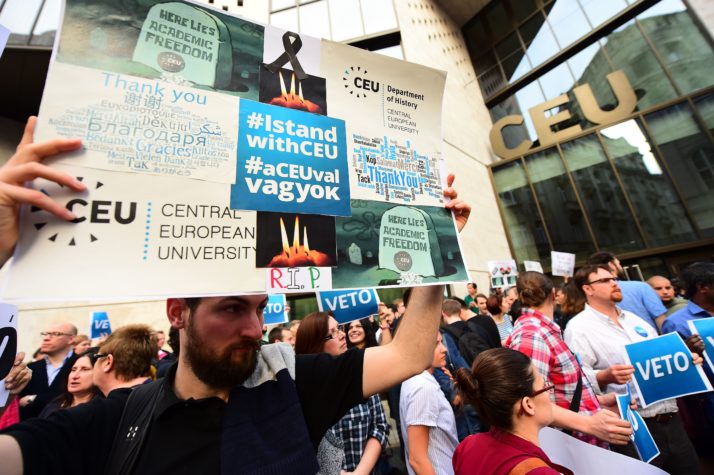In modern societies, academic freedom is typically treated as a sacred cow. Up until recently, even semi-authoritarian regimes hesitated to close down universities, define the terminology of academic degrees along ideological lines, conduct smear campaigns against researchers because of their topics of interest, or censor the schedule of academic conferences. In such regimes, academia used to function as a refuge for intellectuals who could justify their status with the standard qualifications of science even if they disagreed with the government.
Not any longer. These taboos are broken one after another on the periphery of Europe, in countries such as Turkey and E.U. member Hungary. On the Hungarian front, the very latest development is that a number of researchers were asked to withdraw their presentation at the Hungarian Academy of Sciences because of the “political aspects of the topic.”
The list of affected presentations included “the legal aspects of social media” and “the success of men and women in information technology based on Big Data.” The story of the latter case is particularly telling. The researchers changed the title of their original paper (“Gendered behavior as a disadvantage in open source software development”) to avoid provoking Prime Minister Viktor Orban’s regime by using the word “gender.” The self-censorship did not help, as the Academy officials sensed danger and moved the presentation away from the main program to an off-site event. The term “gender” recently became an anathema for the ruling populist, right-wing Fidesz party.
In August, the Fidesz-government initiated the discontinuation of Master degrees in gender studies. While Orban’s administration claims the ban should be introduced because employers are not interested in graduates from the subject, critics say that the boycott is part of the administration’s “culture war” against liberal targets. There has not been made a final decision on the matter yet, but the proposal is worrying.
Attacking Academia
The spectacular phase of the attacks against academia started with the so-called “Lex CEU” in 2017. This amendment of the higher education law complicated the survival of foreign universities as their existence is now conditional to the decision of the government. The regulation passed the Hungarian parliament in April and sets stricter rules for the granting of licenses to foreign-based universities. Many accuse the government of designing the law to shut down the Budapest-based Central European University (CEU), that was founded in 1991 by George Soros to help facilitate the transition from dictatorship to democracy in Central Europe.

In line with the law, the CEU license of operation can be withdrawn on January 1, 2019, if the government fails to sign an international treaty with the State of New York. According to the 2017 amendment, universities from outside Europe can teach in Hungary only if their operation is supported by an agreement between their home government and the Hungarian government.
Initially, the Hungarian officials indicated that they are ready to conclude such a treaty with the Governor of New York. The negotiations lasted until the fall of 2017 and resulted in a mutually agreed draft. But since then the Hungarian government keeps postponing the signature. It is increasingly likely that the negotiations may have been a sham.
The university does not face an existential threat since many countries, most importantly Austria, are happy to welcome the educational institution on their soil. But Hungarian academia will suffer damages. Out of the 17 European Research Council grants in Social Sciences and Humanities won by Hungarian institutions, 15 are hosted by the CEU, as well as the only Synergy grant of Central Eastern Europe.
Threat to CEU is Threat to Rule of Law
More importantly, the threat to CEU is a threat to the vestiges of the rule of law. The university turned to the Ombudsman because of the discriminatory nature of the new regulations, but the public advocate refused to take the case arguing that the Constitutional Court is already involved. But the Constitutional Court also declared that it could not examine the constitutionality of the government’s actions because the case is in front of the European Court of Justice. Since the survival of these Hungarian “independent” agencies, just as the survival of the Academy of Sciences, is hanging by a thread, and all office-holders owe their office to the ruling party, actual legal assistance is unlikely to materialize.
The government officials don’t respond to the repeated calls of the university to sit down and sort out the differences, and the Western pressure seems to be ineffective. The Central European University can only hope that the Hungarian Prime Minister will follow the example of the Russian President. Vladimir Putin recently restored the license of teaching of the European University in Saint Petersburg. In many areas, especially in the regulations of NGOs and the mass media, Orban copies Putin’s ideas and measures. It would be a shame if he missed this one.
Disclaimer: The views and opinions expressed here are those of the author and do not necessarily reflect the editorial position of The Globe Post.




















